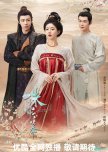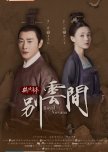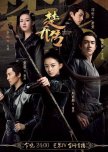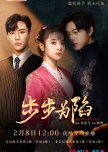
It is twice the pleasure to deceive the deceiver.
This Chen Kaige production more than lives up to its pedigree with a fresh and intriguing plot, unforgettable characters, eye popping visuals and costumes and movie quality production values overall. It is the rare Chinese drama that delivers a hefty and completely satisfying wow factor at the end that actually exceeds the exciting, high octane start. Unlike most Republican era dramas, this one is not at all just plain depressing and yuck.On his way home, fresh graduate Hua Minchu (Oh Hao) finds himself entangled in the affairs of the Eight, a vast and powerful jianghu alliance representing eight professions or guilds (spies, sages, mechanics, deceivers, thieves, assassins, poisoners and entertainers). The Eight guild masters have been long awaiting the emergence of a new leader (their Holder) to help them "go legitimate" by disbanding and exiting the grey underworld economy to become upstanding and productive members of society. But this is easier said than done as different factions emerge and other forces plot to seize power and unlock the secrets of a fabled magnificent treasure.
This drama bursts with colorful and multi-faceted characters from the most banal to the most divine; the most loyal to the most diabolical; the most compassionate to the most deadly and the most transparent to the most deceptive. While Oh Hao's Hua Minchu is clearly the lead and very well acted, this drama is about teamwork and the entire idiosyncratic cast steals my heart. All of the guild masters are legends unto themselves; each bringing an unmatched skill to the table that complements the skills of the other masters. Both good and bad are so dynamic, bad ass and so utterly awe inspiring it is literally a gangster's paradise. I love that this drama is about a team that works together, loves together, rejoices together and mourns together - the sum of the parts is greater than the whole. It is big fun to watch such impeccably well acted character dramas like this that doesn't just focus on one lead character. That said, I must admit that Oh Hau/Hua Minchu is delicious! He is a man's man - tall, tan, charismatic and ruggedly handsome - unlike the super androgynous, pasty white faced effeminate male leads we see too much of. He is not the best fighter nor does he always make the best decisions but he is clever and dang - he is way too sexy for whatever outfit they pour him into! I watched this through what I (mistakenly) thought were gaping plot holes just to savor his effortless charm and masculinity.
The villains in this show are very good villains - just as deadly, well resourced, smart and cool . Among others, our heroes are pitted against main villain Fang Yuanji, a viciously brutal, steroid enhanced lean mean killing machine and a shadowy mastermind with an opaque agenda. I had my heart in my mouth every time the Eight engages in hand to hand combat with Fang Yuanji and all their encounters are shockingly consequential. I don't think I need to elaborate on the visual virtuosity of action scenes produced by Chen Kaige - and in truth I don't have the words to do them justice.
From the start, I saw this as a character drama and did not have high expectations in terms of plot so I was wowed when it actually delivered. The story is tightly written and the plot unfolds at an exciting pace with enough conspiracies, twists, angst, betrayals, manipulations and manifold adventures within the well constructed and engaging arcs. However, it is not that easy to develop believable romance threads within such an action packed and heavily character laden story. As such, the romance between Minchu and Xishui (Tan Songyun) was not convincingly developed and it was quite obvious that many of their scenes were cut. That said, they still had good chemistry and Tan Songyun is always adorable, she just seemed to have been dealt a bit of a raw deal on her scenes. I don't enjoy triangles generally but in this case, it is handled very well and turns out to be actually relevant to the plot. In the middle, plot holes emerged with key actors making uncharacteristic decisions that had me rolling my eyes. And then in the final two episodes, I realized I was fooled - everything makes sense and every major loose thread comes together in an EPIC showdown and an exhilarating finale that will leave you thrilled, agonized, shocked and completely and utterly pleased by the way the deceiver is deceived. This is the one drama I have seen this year with a truly strong finish and it is the way dramas should end - shortly after a thoroughly satisfying climatic peak.
Make this the next drama you start. You can thank me later. My 8.0/10 rating would be higher were it not for the cut episodes and the somewhat weaker romance arcs.
Was this review helpful to you?

Nirvana in Fire Season 2: The Wind Blows in Chang Lin
28 people found this review helpful
Closure
While NIF2 works as a superb standalone story, it is best appreciated if watched after NIF. Also be aware some of my comments may be spoilers for NIF so best not to read this if you haven't watched it.NIF2 is the story of the changing fortunes of the Changlin family as together with the Liang empire, they navigate a changing of the guard. While the story skips a generation, the ghost of Lin Shu "haunts" the drama. After all, the powerful Changlin Army is the legacy Prince Jing created in Mei Changsu/Lin Shu's memory. Xiao Tingsheng, the now elderly Prince of Changlin instills in his family the same moral values, duty, honor and loyalty that were innate to Prince Jing and Lin Shu. His sons Xiao Pingzhang and Xiao Pingjing grow up with and share a deep bond beyond blood ties with their imperial peers, especially the Crown Prince and their cousin Xiao Yuanqi. Their proximity to the throne and unbalanced power in the court is feared and envied by many. This sets the stage for political plots and intrigue at the highest levels of the court that pose many challenges for the Changlin family. This brings the free spirited and fun loving Pingjing back from the famed Langya hall to aid his more responsible elder brother Pingzhang, the heir who already shares their father's duties.
In NIF, we can only imagine what young Lin Shu's life was like. NIF2 invites us to experience being in the bosom of a close and loving family at the epicenter of power in the empire. We laugh and we cry with them, their friends are our friends, their foes our enemies, their hopes our hopes and we feel the pain of their losses in an acute and very real way. The script-writing and plot in this drama is deep and masterful in a way that rivals that of NIF. While political plotting, revenge, justice, loyalty, morality, duty and envy are still strong themes, it dives more deeply into relationships between sovereign and subject, parent and child, husband and wife and siblings and cousins while exploring the fine line between good and evil and nature vs nurture. Unlike NIF, the story does not revolve around one core character but a number of key characters. Like NIF there are many grey characters and even the good characters are very realistically written with their own strengths and flaws. These lead characters evolve over time as the story-line spans a generation shift and explores how these characters deal with change. The second half of the drama focuses on the younger generation and this is where weakness in the acting emerged as these demanding transitions are played out by younger and less experienced actors. That said, overall the cast was very strong and well populated with many veteran actors.
Newcomer Liu Haoran's Xiao Pingjing was stellarly portrayed from start to finish. He managed to "grow up" from the immature, playful, outspoken, impetuous and slightly irresponsible younger son to be a skilled pugilist, brilliant general and military tactician, the rising star of the Changlin family. This actor immediately conveyed that Pingjing must be what a young Lin Shu (whom we never met in NIF) would have been like. He is the young actor to watch coming out of NIF2. Sadly his love interest Lin Xi was played by a limited and forgettable young actress. Lin Xi's father was killed before she was born so she is an aloof character, a talented and capable lady doctor. She had to make a terrible, controversial and life altering decision in this drama. This is an awesome part that a better actress could have killed. This one wore a perpetually tragic expression and when pressed to defend her decision she overacted, wailing in a completely out of character way. There was no chemistry between Pingjing and Lin Xi and as a couple, they were not convincing. Pingzhang and his wife Meng Qianxue on the other hand were touchingly in sync with each other. Fortunately this is not a love story although there is more romance than NIF. Both female leads were strong and well written characters but only Meng Qianxue's role was well acted.
In the second half of the drama, cousin Xiao Yuanqi also comes of age, clawing his way up despite the disgrace his father (the youngest son of Prince JIng) brought on to their branch of the family. Yuanqi is a chameleon and the most interesting, complex and empathetic character in the entire drama. To be fair it is a challenging role, one that actor Wu Haochen was not up to. While his performance was technically good, it was also pedestrian and boring. He simply lacks onscreen presence and charisma. I didn't want to watch him and would either tune out or tune into whoever he was sharing the screen with. This was too critical a role for them to have miscast so badly. The character itself was exceedingly well developed, it just didn't come to life in the right way. It is why for me this drama is not a perfect 10 even though the script, plot and story-line can hold its own against NIF.
NIF broke my heart because even though Lin Shu/Mei Changsu got his justice, it was his final act. What he lost could never be recovered. I was inconsolable for a long time. Watching NIF2 was cathartic because NIF2 shows us that his legacy and everything he stood for lives on in all the lives he touched. And despite its own tragic moments, in NIF2 we get to imagine that maybe Lin Shu came back to fulfill his final promise. That gave me the closure I badly needed.
Was this review helpful to you?

Who's your daddy?
Destined is a story about how an unlikely couple discovers themselves and each other and survive turbulent times together. Liu Yuru has been auditioning all her life to be a worthy wife to the finest young gentlemen in Yangzhou. To her aghast, she finds herself engaged instead to Gu Jiusi, the scandalous scion of Yangzhou's wealthiest family. Gu Jiusi is no less dismayed to find himself shackled to such a paragon of virtue but he is chastened by his careless prank that got them in that situation. They hilariously find that they are actually well suited and the sum of their parts is greater than the whole. The first arc is by far the best; it is funny, romantic and underpinned by genuine chemistry and rapport between Song Yi and Bai Jingting.The couple's newfound bliss does not last as the country is swept into chaos as civil war breaks out. At their loss of influence in the capital, the Gu family is forced to flee Yangzhou for Youzhou far to the north. There they are still inevitably caught up in the war and ensuing political upheaval. Meanwhile, in the shadows, a hidden mastermind plots their downfall at every turn. There is a marked dark tone shift in the drama as it delves into the political arcs in the latter half. This drama explores the - "Who's your daddy?" question and whether it matters. All of the main characters have bad dads to different degrees; overly-indulgent, indifferent, overly-judgemental, negligent, wilfully blind and missing in action. Most of them are no worst for the wear but others allow their resentment to get the better of them.
This is a very entertaining drama despite that the second half is sloppily written and ridden with logic holes. The source material evidently had more substance and depth but the drama adaptation falls short on multiple fronts. The plot and character designs don’t make sense without novel readers to help connect the dots (see @CloudA’s discussion threads). The best written parts include most of Jiusi and Yuru’s arcs and humorous moments. The political arcs have too many logic gaps and farcical sub-plots that undermines the intelligence of allegedly smart characters. The writers have a very superficial understanding of history, politics and inner palace protocols. It is mystifying why the Dowager Empress does not secure the position of crown princess for her daughter in exchange for her support. Instead she uses up all her goodwill to try to foist her on a happily married man! The new emperor is so weak instead of banishing these harpies to the cold palace, he allows them free rein to bully his loyal court officials and interfere in official proceedings. He puts a known villain in charge of the crown prince's education when both Ye Sh'an and Gu Jiusi are obviously better choices. They forgot to tell us Luo Zishang has an invisibility cloak that gives him better access to the emperor's bedchamber than a favorite concubine! Game of thrones in this drama pretty means Pass the Throne (parcel). This kind of writing is why fluffy romance writers should stick to their knitting and not try to write about stuff they know nothing about.
What does make this drama work is phenomenal acting all around that papers over the lousy writing. All of the main actors are incredibly charismatic and blend into their roles so well that the portrayals surpass the character blueprints. This is especially true of Liu Xueyi's mesmerising ability to make the vicious, misguided and tragicomic Luo Zishang seem sympathetic even though his backstory and motives are not well explored and only fully revealed at the end. As a result, for most of the drama, this character comes across as a cardboard villain; a delusional sociopath that is just evil for the heck of it. Similarly Fan Yu's character evolution takes abrupt turns and his interest in succeeding his father is not well explained. Fortunately the good characters in this drama are far better written than the tired trope of villains who blame their bad behavior on their bad dads. Their motivators are not as forced and it is a lot of fun to watch the rapport, loyalty and friendships between them blossom so organically. After Jiusi and Yuru, Zhou Ye is my favorite character even though he can be a noble idiot. He just gets really hard things done and done right in the nick of time to save the day.
In the final arc, both Jiusi and Yuru are sidelined so that everyone else can do absurd things to let the villain easily get the upper hand. We are short changed of a satisfying final battle of wits between Jiusi and Zishang to make way for a very anti-climatic reveal of Zishang's backstory that devolves further into a maudlin moment of truth and reconciliation that somehow diminishes both characters.Along comes Zhou Gaolang to bravely re-take a city that was already in hand! There was a senseless, gratuitous death of a terrific character just to squeeze a few audience tears and to add insult to the injury, the perpetrator was unjustly sentenced to live the life of the idle rich. While many favourite characters got good outcomes, some of them deserve better and the final denouement fell flat and was anti-climatic This drama peaked too early at King Liang's epic siege and went downhill from there. The early arcs were an 8.5 for me but the back half was at best 7.0/7.5. Even though I can only rate this 8.0 overall, it is still a very enjoyable drama that is shored up by some fantastic acting. It is best watched tipsy or with your brain half switched off as the plot does not bear close scrutiny.
Was this review helpful to you?

Tale as old as time.
The Legend of Shen Li is a highly entertaining xianxia with a terrific starting hook. Injured while fleeing an unwanted marriage, Shen Li crashes into the mortal realm in her innate phoenix form. Mistaken for a chicken, she is rescued and healed by Xing Yun, a sickly ginseng salesman. Never in my wildest dreams did I think I would be shipping an unseemly attachment between a haughty chicken and a weak but insolent mortal. Their hilarious interactions and witty repartee had me grinning like a fool. This has to be the first CP that I got invested in before the FL properly meets the ML.While I find Legend of Shen Li quite enjoyable, it is a tale as old as time and I am not just making fun of Xingzhi's age. This kind of forbidden love story between a lonely, crusty old god and a much younger one is the staple of this genre. This one is written more as a character story so there is little plot movement until the second half of the drama. The plot itself leans heavily on well known xianxia tropes with a modern, role reversal approach. What makes it special is that it is well executed, the main CP has scorching chemistry, it is anchored by a stellar cast and tongue-in-cheek dialogue has deep and heart tugging undertones. This is an excellent entry-level xianxia that will thrill and delight newcomers to the genre the most. While die hard fans of the genre will certainly enjoy the fresh take on old themes, they may find the plot predictable after the early arcs.
For me, the mortal realm is always the most interesting xianxia arc and this is no exception. It is at the same time the most disappointing arc in terms of missed opportunities. It is too short and half the time Shen Li is an angry CGI bird. Shen Li's feelings for Xing Yun developed so quickly I felt shortchanged on the how and the why she fell in love. Worse, their story is overshadowed by the two utterly heart wrenching ill-fated love stories. To some extent, the narrative coasts on the residual heat from Princess Agents and assumes the audience is already invested in the main CP. The issue is viewers who did not watch that may not feel the chemistry between them. The arc ends so abruptly that it barely dawns upon me that Shen Li's affections could be one-sided. She very high-handedly falls for a helpless mortal and doesn't give him any say in the matter because she knew it to be transitory. This is quite sad and complex and it is a pity the narrative dealt with it too cursorily.
As someone hungering for closure from Princess Agents, I am stoked to report that the chemistry between Lin Gengxin and Zhao Liying burns as hot as ever. This drama is generous to a fault in fusing passionate love scenes with humor and moving romantic moments. I find myself chuckling at how hot and flustered Shen Li gets by Xingzhi's shameless flirting until the veiled pathos behind Xingzhi's careless words hits me and makes me tear up. Both characters are designed to recycle the strengths of their previous collaboration without taking much risks. Notably, there is no extra dimension or complexity to Zhao Liying's role or portrayal. She once again delivers in spades what she does best from the brilliant, combative glitter in her eyes to her signature awesomely bad-ass fight scenes. I would have liked to see more facets to King Bicang beyond the fierce warrior with a deadpan expression who is casually cruel to CGI animals. There is more scope for Lin Gengxin to shine as Xingzhi is a contradiction; the most powerful and yet the most powerless being in the three realms. I was impressed by Lin Gengxin's heart wrenching and nuanced portrayal of this so very alone ancient being who will crack a joke to stop your heart from breaking for him.
As a couple, Shen Li and Xingzhi are too perfect for each other - their world view is largely aligned and besides the one bombastic obstacle of an existential crisis for the realms, there is no real conflict in their relationship. While they experience some acutely angsty moments, they are all short lived. Most of the intense and lingering agony in this xianxia actually comes from the three devastating side love stories. Both characters are fully realised beings that don't grow much. That is left to the likes of Furong who is my favorite character in the first half of the narrative and the character that shows the most growth overall. His limelight in the second half is stolen by Lady Jin who is by far my favorite character and one who saves the draggy second half of the show for me. I find the villains quite boring and archetypal and those roles are also the least well acted. Even though Shen Li and Xingzhi come together in a moving and masterful ending climax, the finale is too much of something I have seen many times before. I did not enjoy the extended ending fight sequences and the heavy handed CGI.
Despite the unoriginal plot, this is an excellent character driven story. I was invested in many characters beyond the leads - Furong, Youlan, Qing Ye, Feng Lai, Mofang, Lady Jin and the indignant Cluck Cluck. The dialogue uses comedy brilliantly as a gateway to the profound in highlighting complex, deep and at times tragic existential themes. I enjoyed the conversation about how if we can work together against evil, we may no longer need gods to be our babysitters. I also felt a shiver of fear in this age of AI at the idea that as creators, one day we will become an existential threat to our creation. Overall a very enjoyable and highly recommended funny and intelligent xianxia that I am happy to rate 8.5/10.0.
Was this review helpful to you?

All style no substance.
I was really excited to watch this Republican period detective drama. Having enjoyed Hu Yitian and Zhang Yunlong's chemistry in My Roommate is A Detective, I couldn't wait to see them team up again in a similar setting. The adaptation of Agatha Christie's Poirot mysteries seemed like an added bonus. Sad to say, despite the visually sumptuous set and costumes, both the characters and cases are bland, uninspired and the pacing is very draggy.While Situ Yan is the lead detective, he is not meant to be a literal adaptation of Hercule Poirot. Poirot with his known eccentricities including his fastidiousness and obsession with symmetry, is one of the the most distinctive, well dimensioned fictional detectives ever. He has a clear process and methodology that is based on human nature and psychology for solving the case. I would never cast Hu Yitian as Poirot and I am ok with the fact that Situ Yan is not Poirot. What I am not ok with is the colorless, cardboard characterisation of Situ Yan as simply a highly intelligent but rather lethargic lawyer with a strong sense of justice. Hu Yitian does his best with the role but he doesn't have much to work with. This is made worse by Luo Shaochuan, the money guy whose contribution to the crime solving aspects of the partnership is unclear. This character is so indifferently written it is not worthy of an actor of Zhang Yunlong's calibre. The two leads get little screen time together as they go down disparate paths in the investigations. Unlike their previous best loved collaboration, Zhou Mowan is more often Situ Yan's sidekick than Luo Shaochuan is. Thus we don't get to enjoy their banter and their incredible chemistry that builds up and fleshes out both characters as they work through the cases. While both female leads are well written and likeable, they crowd out the bromance.
When it comes to adapting these beloved Poirot classics, I am no die-hard Christie purist. I am receptive to and have seen good adaptations that take a fair amount of liberties with the original works. This can be successfully achieved because changes notwithstanding, the adaptation remains true to the essence of Christie; the psychology of the crime. This is where Checkmate fails to deliver. The supporting cast is very mediocre and lacks screen presence. Bland storytelling and poor pacing with unnecessary romantic digressions disrupts the build up in suspenseful tension into the final reveals. The cases must be evaluated convincingly from the point of view of each character, to assess their psychology as a sense of imminent peril escalates. Who was the victim? Why would someone want them dead? Who would cross that line and actually do the dastardly deed? This drama fails to make me feel invested in the human aspects - the victims and potential suspects; it fails to create a sense of urgency to solve the case or engender that mixture of sorrow, pity and revulsion for the perpetrator that is signature Christie.
The first case is Murder on the Orient Express, a well known case that has been adapted to death. While this version does not stand out, it stays close to the original and is fairly well done. Although Roger Ackroyd is also quite well done considering how difficult it is to adapt an unreliable narrator case into this format, from there, things start to go downhill. These cases are masterpieces; material changes should be weighed carefully and not made with the misguided idea that such impeccable Christie plots have scope for improvement or merely for the sake of delivering a surprise twist. Which is what they did to one of my personal favourites. They went for the plausible alternative solution which simply did not fit the human nature aspects of the case. And thus fails to deliver Christie's magic wow factor, the thrill and the chill and that sense of shock, sorrow and acceptance that it all made sense; that it is the best and only solution. It devolves further as cases are stitched together in a cut and paste fashion that is increasingly incoherent. The final case bears little resemblance to what I think must be the original. While it took no genius to spot the the final antagonists a mile away, their motives are uninteresting and unconvincing and the ending is frankly farcical.
If you are a Christie purist, I would say avoid this drama. You will feel they have desecrated some of the author's best works. If not, this is a watchable if unexceptional adaptation. The production values are quite good and the Republican period setting in Harbin has some novelty appeal even though the drama overall is all style no substance. This is a 7.0 for me but I would have rated it 7.5 if they didn't ruin Five Little Pigs and finish in such an absurd manner.
Was this review helpful to you?

A crying shame.
The Story of Pearl Girl is the story of an intrepid pearl diver's harrowing journey from the despair of a slave farm to the heights of the prosperous Yangzhou jewelry guild. Aided by an erudite nobleman Zhang Jinran and a ruthless and calculating merchant Yan Zijing, Duanwu escapes from the exploitative clutches of the Cui clan. She throws her lot with Yan Zijing, choosing to make her own way in the world as a merchant galley serf over the more certain future of a nobleman's harem. After multiple betrayals and double crosses in the dog-eat-dog culture aboard Zijing's ship, she emerges clear eyed and better equipped to survive a ruthless, avaricious business world. She learns that underneath his merciless facade, Zijing is saving her by teaching her to save herself; that they have a shared past that she has barely scratched the surface of understanding.Set in a cruel world fraught with treachery, avarice and oppression that belies the ostentatious luxury of the jewelry trade, the narrative is laden with an air of heaviness from start to finish. It is a character story about how one resilient woman fights her way to the top of the jewelry business during feudal China. The characters are well designed with Duanwu and Cui Shijiu as two women who have to fight for their place in a man's world; one who starts with nothing and the other with everything, to lose. Likewise the cynical and realistic Yan Zijing went to the school-of-hard-knocks while the righteous and idealistic Zhang Yiran clearly had an ivory tower education. Both Yan Zijing and Cui Shijiu are consumed by revenge and on opposite sides of a blood feud not of their own making but one's cause is just while the other's is not. I enjoyed watching how these characters, with at times common and at other times with opposing world views interact and react to the situations they are thrown into. Plot wise, the logic holes are evident from the start but for character driven stories, I am very forgiving for as long as the characters stay largely consistent and relatable. But once the characters start to unravel, the issues with the plot are amplified and the entire narrative becomes a mess.
I genuinely enjoyed and was engaged by the first arc of this drama. It is both fascinating and difficult to watch the stunning backdrop of the swashbuckling high seas and the exotic and dangerous Silk Road marred by the unmitigated oppression and cruelty of the ancient world, especially towards women and children. Zhao Lusi's Duanwu is spirited, tenacious and undaunted as she fails again and again until she succeeds. I could understand why Yan Zijing resonated better with her but could also see that she lacked the maturity to appreciate how Zhang Yiran's wisdom and knowledge of the law would aid her later on. These three main characters richly complement each other in their strengths and flaws to make a formidable team when they work together. I didn't mind the romance but I didn't need it and it went a bit abruptly from red flag master-servant to lovers. Nonetheless I was looking forward to it growing and had hoped to see them right past wrongs together. I did not expect it to take a wrong turn down the path of the worst noble idiot trope in recent memory, nor for it to last pretty much until the end of the drama. That is when The Story of Pearl Girl, turns into yet another period drama that starts strong and then inexplicably nosedives at the mid-point and never manages to recover.
After the convoy arc, a traumatized Duanwu re-emerges as Su Muzhe, a detached, gently sad and bland character who Disney princess cries almost every other episode. Lusi's vapid and weepy interpretation of the role lost me as much as her Duanwu engaged me. Duanwu would have gotten angry and demanded an explanation from Zijing or plotted revenge. I was baffled by the Su Muzhe who manages to coldly co-exists with him in the same city, moves on and focuses on business, vowing to live a good life nonetheless. This is so out of character it is almost impossible to reconcile Su Muzhe with Duanwu. I rooted for the feisty Duanwu of the first half who dares to love and dares to hate. The passive aggressive Su Muzhe who only dares to cry turns what could have been a terrific story into a crying shame. The narrative meanders into maudlin sub-plots about boring and poorly acted tragic side characters. Gratuitous crying scenes have diminishing impact, no matter how good the actor is at them. Long before the drama ended, I was bored by Su Muzhe's endless pity parties and stopped caring for her. Su Muzhe is not the kind of role that plays to Lusi's innate strengths and charisma. I hope she avoids taking on such characterisations in the future.
The other narrative mistake was to separate the three anchor characters at the same time so many of the early supporting roles are transitioned into new ones, forcing the audience reinvest in new characters all over again. Yue Yunxiu is a boring, flighty character that has no chemistry with Su Muzhe and fails to shore her up in the same way Kang Ju lifts up Yan Zjijing. The entire business partnership between the women lacks flair and pizazz; I can't imagine any joy in shopping for jewelry at an establishment run by such a dolorous pair. The narrative makes a lame attempt at comedy too late in the game and it is largely left to actors that lack Lusi's fantastic comedic timing. Even when the three friends join hands again, their dynamic is not the same and Duanwu never reemerges.
As for the romance, it stagnates even after they reunite and never blossoms into a full blown relationship. I would have liked to see them seize the day and live in the moment in a way that gives us something really worth crying over. Instead all we do is watch them mourn what could have been. It is incredibly unfair to Muzhe because Zijing refuses to move forward but yet can't set her free either. I wish they both chose differently but since they did not, the way their romance ends is fitting. I respected Zijing's choices especially in the end but I think Su Muzhe's victories were all hollow and I hoped she would find Duanwu again within herself but she never does. I enjoyed how Liu Yuning portrayed Yan Zijing's darkness and complexity but after the best first arc, he is too quickly whitewashed and sidelined. Even though the final arc is all about his justice, he doesn't get to do that much as the hidden villain is too obvious to the audience early on and most of the antagonists are so dumb they pretty much outed themselves.
Zhang Yiran is the best of friends and that rare character that does the right thing even when its the wrong thing for himself. While Duanwu didn't fit in to his world, he may eventually have been able to console Su Muzhe and I wish they had left that door open just a crack. As for Cui Shijiu, this character caught and held my interest from start to finish as a result of Xie Keyin's bold screen presence and her husky and earthy vocals. Her character is flawed, not that smart or especially well written but Xie Keyin embraced her flaws in such a relatable way and conveyed the role so compellingly that I cared about her and did not drop this drama because I wanted to know how her story ends. She and Zijing are both characters that choose revenge over love but only one of them lives to regret it.
The biggest issue with the storytelling is that it tries to incorporate too many themes and archaic ideas of what an independent and empowered woman is supposed to be. The writers bend the plot and characters in ways that don't make sense or is out of character in order to force certain themes and outcomes. This is not a good way to tell a story. Both Duanwu and Zijing's characters are thrown under the bus just to prove that a woman can make it on her own in business during feudal China. We watch allegedly smart villains kill off characters with no motive other than for dramatic impact and shock value. But what makes me really mad is that it is another scratch on the surface empowerment story written by misogynists with a thinly veiled and insidious message about the fate of women who dare to try to make it in a man's world. A true empowered woman would seize second chances and live well in the true and full sense and meaning of the term rather than to wander aimlessly as a shadow of their former selves.
This was a heavy journey from start to finish that does not end in satisfactory way and the ending contains some really questionable messages. There is no payoff for all the suffering, no one gets a great ending and promises to live well were not kept. In the name of both Madame Eight and Shrimpy, I dare not rate this more than 7/10. It is not a drama I recommend unless you are a die hard fan of either of the lead actors and are able to enjoy anything they are in.
Was this review helpful to you?

All the world's a stage.
The Double is a dark and melodramatic soap opera about revenge and regret. It is a soap opera to end all soap operas in terms of high theatrics, spinning hussies, piercing death glares, shocking twists and the sweet, savage satisfaction of retribution. To best enjoy this, don't look too hard at it as the narrative is littered with logic and plot holes and absurdly dramatic, historically impossible scenes. The male lead Duke Su flirts with breaking the fourth wall repeatedly to urge us to just watch the play, a reminder that all the world's a stage and we should just suspend disbelief.Xue Fangfei, the most elegant and cultured lady in the capital, is cruelly betrayed and dumped in a shallow grave. She is rescued by Jiang Li, the Chancellor's daughter who is wrongly condemned and banished by her family to a convent. Fangfei assumes Jiang Li's identity and returns to the capital; vowing to clear both their names and make their enemies pay. She is aided by the enigmatic and powerful Duke Su who helps her because she intrigues him and could prove useful to him down the road. The romance that develops between them unfolds at a leisurely pace as they each have high stakes agendas that predictably converge.
Duke Su must be be every scorned woman's ultimate fantasy "consolation" prize. This magnificent specimen of manhood is highly born, tall, dark, handsome, powerful, and with a diabolical mind to match Xue Fangfei's. The icing on the cake is this sexy beast that wields a fan more effectively than a sword does not come saddled with nasty in-laws. Wang Xingyue's potent portrayal of Duke Su is spot on from the tinge of humor that belies his stern expression, his double entendre laced dialogues to how in unguarded moments his eyes devour Xue Fangfei with almost indecent longing. Despite the seductive build up and combustive chemistry between the main leads, the ultimate pay-off to their slow burn courtship falls far short of wild and wicked and only delivers a chaste candle-gate moment.
Even though I shipped Duke Su and Xue Fangfei immediately, I appreciate how Fangfei takes the time to rage, to mourn her loss and to get closure so that she can properly move on. To me, Wu Jinyan obviously looks older than Wang Xingyue, butI think this casting makes sense. Xue Fangfei is a woman who lost everything; her reputation, her lover, her entire family. That kind of shocking devastation would age anyone tremendously and Wu Jinyan's ravaged, strained and wild wide-eyed expression in the early episodes is brilliantly in character. The narrative does not shy away from presenting her marriage as one that had depth and substance. Thus they are still in perfect unison when they play their haunting duet; a song of profound loss, resentment and regret. Wu Jinyan plays the avenging angel so perfectly I got unholy enjoyment out of watching Shen Yurong squirm knowing that Xue Fangfei, who knows him better than he knows himself, is coming for him.
Shen Yurong is a character that I find hard to be that angry with because as it turns out, his perfidy results in such a massive upgrade for Xue Fangfei. Liang Yongqi really slays in this complex role of a promising, rising young official who catches the eye of the wrong woman and ends up betraying his ideals. He is quite a pitiful creature who trades in domestic bliss for living dangerously at the beck and call of an abusive, insecure and bat-shit crazy spinning shrew that his own dear mother pimps him out to. I can't decide if I pity him or despise him more. Because in truth, he already lost the moment he chose to betray his muse and the love of his life. The moment of peak retribution is when it dawns upon him what a prize he lost and is forced to face the limits of his own character. I thoroughly enjoyed how the narrative peels away the many layers of hypocrisy, ambition, sophistry and duplicity to reveal a weak, impotent coward who lacked the courage of his convictions. To me, this is the most complex and best acted role in this drama.
Even though I have high praise for Li Meng's portrayal of the deranged Wanning, I have little sympathy for this character or her shocking villain origin story. Victimhood does not entitle her to help herself to someone else's husband or kill with such impunity. When she had power and free will, she chose to be King Cheng's pawn, no one forced her. Likewise, I have no sympathy for Ji Shuran or her choices. In general, I dislike these attempts to whitewash villains or somehow rationalize their wicked ways. Bad stuff happened to Xue Fangfei and Jiang Li as well. But they looked for justice without turning into monsters as a result. While Xue Fangfei's revenge, if you can even call it that is very satisfying, Jiang Li's left me feeling bereft. Ultimately Xue Fangfei is a character that lost nothing and gained everything. It is Jiang Li who is truly the injured party and even though she is vindicated, all the king's horses and all the king's men can't put her together again.
Despite the addictive start, this drama loses momentum by episode 30. The storytelling lingers too long on weakest Jiang family plots arcs. They are boring and unoriginal, borrowing heavily from what were also weak arcs in Princess Weiyoung. Jiang Li's cousins are archetypal characters that were not complicit in Jiang Shuran's treachery. I find it unfathomable the drama chose to focus on their tawdry squabble over a callow rogue instead of uncovering the many layers of the far more fascinating Duke Su. As a result, this character with so much early promise ends up not as well developed as Shen Yurong and Wanning. To add insult to the injury, almost as an after thought, he is featured front and center in a baffling truncated half episode final arc that serves up gratuitous angst and some unearned and unjustified pin-cushioning of good characters. It is nothing short of a grift to squeeze money from viewers for a mundane glimpse of domestic bliss. As far as I am concerned this drama ends where it should a bit past the halfway point of the final episode. All the rest is dross.
This is a super addictive soap opera that doesn't hold up under close scrutiny. Where it excels is in serving up high drama and angst with super cool and satisfying but absurd vignettes that don't necessarily advance the plot. Nonetheless I was happy to rate this better than 8.5 until it started to sag and waffled into a lame and wishy washy ending that leaves me no choice but to call it an 8.0/10.0.
Was this review helpful to you?

Women hold up half the sky.
Song of Youth is a historical Chinese soap opera that pays tribute to 红楼梦 Hongloumeng (Dream of the Red Chamber), widely regarded as China's greatest novel. Fans of the novel will immediately recognize that the backstory of an aristocratic family in decline and the multiple character blueprints that are based on this vernacular classic. Uniquely, this narrative plucks out the all-consuming, angsty, tragically epic love triangle that forms the core of the novel and focuses instead on broader, often less appreciated themes. The love triangle is still there but it is been muted to the extent that it is only peeks out towards the end.Lin Shaochun, a talented actress from a performing troupe marries Sun Yulou, the youngest scion of the noble Sun family. With her innate resourcefulness and the support of her husband, she becomes indispensable to his initially disapproving family by ably resolving all their internal and external conflicts and challenges. Bai Lu as always delivers a very enjoyable performance as the supportive and loving wife of Sun Yulou and the clever, thoughtful and femininely authoritative Sun family fixer. Even though I think Wang Yizhe has a lot of potential as an actor, he struggled to get into character and I didn't see much spark between him and Bai Lu. But it doesn't matter because albeit with some challenges, their arc is short and it is ultimately a rather pedestrian love match. After that the narrative explores more complicated and more poignant relationships where the couples have limited ability to make their own choices. Very much like Court Lady, Lin Shaochun is just a tour guide through the social structures, culture, relationships, vanities and daily life details of feudal 18th century China. Thankfully unlike Court Lady, Bai Lu's portrayal of the role as occasionally ruthless and not overly preachy and righteous makes Lin Shaochun very likeable if too infallible to be that interesting.
What stands out about this drama is that very much like Hongloumeng, it celebrates the contribution of women to society - Mao Zedong was far from the first to acknowledge that women hold up half the sky. True to the novel, the drama is very female centric - Lin Shaochun is the main protagonist and in a fitting role reversal the ML Sun Yulou is just a prop; an attractive, decorative vase. Even the best antagonists are formidable and devious women. In fact, most of the male characters in the drama are rather weak and not that intelligent - Sun Yulou only pulls himself together to be worthy of Lin Shaochun, his oldest brother is a foolish gold digger's wet dream, his second brother is the most capable of the lot and his third brother is a henpecked wastrel. All of them become better, more successful men thanks to their smart, determined and capable wives. I find both the eldest and (especially) the second brothers' stories to be far more interesting than that of the main CP. Unfortunately the second brother's story fizzles out in the middle and ends in a slightly disappointing way. Nonetheless, Yao Dizu is by far the most multi-faceted and refreshing character in the drama, more so than Lin Shaochun. She is also the only character that gets to be the author of her own story. If Lin Shaochun were written to be more of a bystander and less of the person who always saves the day, this would be a much better drama. She always wins by the same modus operandi so by the second or third arc, I was on to her and the "twists" become predictable.
The other problem with this drama is that it doesn't seem to be written in one voice or tone and thus gives the impression that it doesn't know what it wants to be. I think it is intended to be a satire or parody of bourgeois upper society during Ming Dynasty. Unfortunately in parts the humor is quite slapstick when it comes to Lamu Yangzi and some of Jin Chen's scenes because that matches the kind of humor they do best. Bai Lu and the rest of the cast however, are better suited towards more subtle, satirical humor and when the writing tries for something in between, it comes across as forced and half the time it misses the mark. That said, there are some really good laugh out loud moments but overall the wit and humor is hit or miss. The rhythm of the screenplay is particularly awkward at the beginning but more enjoyable from the middle episodes. After the four brothers' stories, the recycling of themes around the fallout from arranged marriages gets old and the final arcs flatline - I saw the final end twist a mile away so the end was predictable and anti-climatic.
This gorgeous production was clearly shot with meticulous attention to detail from the sets to the authenticity of the costumes, make up and the cultural details. The only lapse is perhaps the fact that the classic Cantonese opera Legend of the Purple Hairpin is sung in Mandarin and not in its original language (this was one of my grandma's favorite operas, she used to play the Liza Wang/Adam Cheng recording all the time). Overall a high quality production that is an enjoyable light watch even though it falls well short of Hongloumeng in terms of panoramic impression, breadth of social commentary and lasting impact. This is fun enough for me to rate this a 7.5.
Was this review helpful to you?

An Oriental Odyssey.
Chu Sijing, a captain of theJinyiwei/锦衣卫 or Embroidered Guard is on a mission to investigate a strange epidemic that broke out on the remote Wumu Island in Liaodong province. The outbreak threatens the adjacent NInghai Fortress, a critical stronghold against the invading Jurchens. The powers that be have their own agendas and appear more interested in covering up the outbreak than anything else. Thus Sijing steals onto the island aided only by a Mongol Tartar official Bo Yan and a Fulangji/佛郎机 businesswoman Angelica. There he encounters mysterious, disease afflicted villagers who worship ancient Gods and is forced to deal with some monstrous truths. Can he weed out the root of the epidemic before it overwhelms them all?This story is set in the 3rd year of Tianqi, when the Ming Dynasty was in rapid decline. It was a time of many natural disasters from meteorites to a mini ice age, drought and famine. Superstition reigned high as the peasants were starving and the emperor was widely said to have lost the Mandate of Heaven. The drama invests heavily in world building and weaves in many themes from the period and fantastical creatures from Chinese mythology 山海经/Classics of Mountains and Seas and 神异经 / Classics of Gods and Spirits. Even though the CGI is not the best, I appreciate the effort that went into how they blended history, fantasy and ancient lore together to make this an Oriental odyssey.
Unfortunately all the research and creativity that went into world building is wasted on the story's plot which hints heavily at a complexity that never materialises. For such a short drama, there are too many subplots touching on many themes that go nowhere. Even ignoring Sandrine Pinna's appalling Disney cartoon character acting, the entire Angelica/Pirates of the Caribbean arc adds nothing to the story. The time would be better spent fleshing out the motives of the Henggong cult and tying up the many loose ends to the story. I usually like Huang Xuan's acting and enjoyed his chemistry with Bo Yan but this is not his best role. Maybe it is the overuse of green screens but I caught him frequently out of the moment and staring blankly into space. Shen Rang is the only character that really moved me and I enjoyed this character design and portrayal the most.
The best things about this drama are that it does try to be different, it is short, some of the action scenes are pretty good and it is oddly enjoyable despite its lack of logical consistency. The ending is anti-climatic, doesn't hang together well, leaves loose ends and is disappointing overall. I am being generous in rating this as a 7.0/10.0.
Was this review helpful to you?

Reunion: The Sound of the Providence Season 2
19 people found this review helpful
Lightning doesn't strike.
Season 2 picks up where Season 1 left off with Wuxie and Xiao Bai leaving Warehouse 11 and assembling a team to journey on to Thunder City. At this point Wuxie is desperately ill and it is not clear whether he will survive long enough to get closure on what happened to Wu Sansheng and unravel the secrets of the Thunder God. This season is better paced and more tightly written, avoids the digressions characteristic of Season 1 and comes to a satisfying conclusion. In this journey, Wuxie learns to live life in the present moment and appreciate the people around him rather than chasing mirages.Unlike Season 1, this season is a lot less about the Iron Triangle. Although we see them and their rapport and witty banter remain the most memorable highlights of the drama, this would be more aptly titled Entrourage rather than Reunion. The issue is that too many members of the team that travels to Thunder City only have modestly well developed relationships with Wuxie and/or Xiaobai but are pretty much strangers to each other. So when they are thrown together in suspenseful or dangerous situations, there isn't that very enjoyable natural chemistry or seamless bond that emanates when the Iron Triangle is together. The only execptions are Xiao Bai and Liu Sang and possibly Hei Yanjing so things markedly improved towards the end when all the "extras" get left behind.
The other enjoyable aspect of this season are that we have two very good villains - Boss Jiao and the spy and one excellent grey character Jiang Zisuan. In fact I would say they somewhat stole the limelight in this season. I was particularly impressed by Wu Lipeng's portrayal of Wuxie disguised as Jiang Zisuan. He literally knocks off all of the little mannerisms and micro expressions of Zhu Yilong's Wuxie to a T. However, it goes on for way too long and to the point where it was no longer even logical from a plot point of view. So the season ends with this feeling that Zhu Yilong/Wuxie was missing in action toward the end. This is particularly disappointing because in the final arc, I expect to see the "real" Wuxie cunningly out maneuvre and confront the last villain. Instead, he pretty much just rocks up for the final two "real" episodes. Even though Zhu Yilong/Wuxie returns for that final showdown, it has a hollow and anti-climatic tone to it, as if he is not fully in character.
Although this season progresses at a much better pace without the marked ups and downs of Season 1, I actually still find both Sea King's Tomb arc and Warehouse 11 arc of Season 1 superior to both Thunder City arc and Imperial City arc of Season 2. That is not to say these arcs are not well done, they truly are but they just were not as dangerously thrilling or mythically suspenseful - I did not feel my heart in my throat the way I did in the first arc of Season 1. This is probably because the Iron Triangle is somewhat overshadowed in Season 2 and it is hard to care as much for the entourage cast. I was praying for the Iron Triangle's survival every moment of the Sea King's Tomb arc. That does not happen in any of the Season 2 arcs - in fact if anything it seems a bit too easy. So despite its overall better cadence of storytelling, Season 2 feels like the thunder rolls but lighting doesn't strike. Thus, I rate both seasons a very enjoyable 8.5 for very different reasons. I separately reviewed Season 1 in greater detail.
Was this review helpful to you?

But I have promises to keep, and miles to go before I sleep.
Patience is required for this drama that is unlikely to enjoy broad appeal. It is a Beijing Academy student production so don't expect high production values; indeed there is a distinctly amateurish and unpolished feel to the entire effort.The shadowy and suspenseful plot is steeped in the supernatural and mythology and takes a long time to unfold. The synopsis, which already gives away much of the story adds to the impression that nothing is happening. Hidden forces conspire to release the demon Jiu Ying, that according to legend was sealed by five deities representing the five elements (metal, earth, water, fire and wood). This manifests itself in increasing hostilities between the You Kingdom and the Wolf Tribe that make war and chaos seem inevitable. These events bring the three siblings Hongxuan, Hongyi and Hongshou whose Baili family has long been the power behind the You throne; together with Ming Yefeng, the leader of the Wolf Tribe who also has a mysterious past with Hong Yi. They are linked by destiny and rediscover their powers so that together with other supernatural beings from a past lifetime, they can once again fulfill an ancient promise to keep the world safe. It is not a complicated or super original fantasy story that culminates in an epic clash between good and evil.
What is interesting about this drama is the characters and the acting. The actors are not given much to work with in terms of dialogue so they have to rely heavily on body language and subtle expressions to convey their characters. This makes the complex characters particularly difficult to get to know and nobody is as they originally appear. It is very difficult to tell who is friend and foe and what their motivations are. For most of the drama, Baili Hongxuan and Ming Yefeng were the most complex and interesting characters for me. While they are both quite grey, both turned out to be quite different from what I expected and almost opposite of each other. I really enjoy this kind of peeling of the onion approach in terms of how a layered character gradually becomes unveiled but many will find this kind of storytelling frustrating and boring.
I suspect many may be interested in this because of Wu Lei and Song Zuer. I admit I discovered this because of Wu Lei. While his character Baili Honsghou is quite one dimensional - the typical c-drama hero that goes through many common tropes; it is the best performance I have seen from Wu Lei since NIF. It is very nice to see how far he has come as an actor; that he is not just an incredibly athletic lean, mean, killing machine. As for Song Zuer, she is an actress that provokes strong reactions, especially when she plays the bratty young girl. I never minded her that much because I always noticed that she has screen presence that belies her small size and her performance in this also showed much progress and was actually quite nuanced towards the end. And it will be remiss of me to not mention how super hot Zheng Kai's Ming Yefeng is - I can't believe I have never seen this actor before!
The story advances much more quickly in the last 10-12 episodes although it appears a bit messy as many characters are introduced at once. But they are not interesting characters and all you need to really know is that they are either obstacles to be overcome or they are there to give some assistance along the way. All of the substantively relevant characters are introduced at the beginning. There are a few nice twists at the end with respect to the emperor as well as the mysterious man in the hood. The ultimate villain (to me was not Jiu Ying) was hiding in plain sight the whole time but their motive for unleashing evil on the world was pedestrian and lame. Most of the so-called heroes or deities in this show have feet of clay, do not have high morals and are not particularly enlightened beings. The story is very matter of factly callous in its treatment of spirits or demons. This is very typical of the genre so if you are familiar with Chinese mythology, you will not be surprised by any of this or how the story ends.
I enjoyed this drama but it is not for everyone. Watch at your own risk.
Was this review helpful to you?

Its in their nature.
I almost didn't watch this. Although many plot threads were left unfinished, I could accept the way they left things for the main protagonists. Why not leave well enough alone? Because I still wanted to know if how things play out with Gu Fengan, Prince Zhao and Xu Changping and who does not want to see more sweet moments between Wenxi and Dingquan?There are some unexplained time gaps but these last 12 episodes are surprisingly well edited and neatly tie up all of the remaining important plot threads. What I like best is that the villain is really good, probably the best one in the entire story and he is taken down by the person he least expects. The plot is also not too convoluted nor overly mired in excessive detail so I found it easier to follow. I am also quite impressed with Zheng Yicheng's portrayal of the more mature Gu Fengan - this promising young actor needs to take on more complicated roles like this.
What remains painful is the relationship between the crown prince and the emperor - it evolves and yet is still the same. Its like watching an unstoppable force meet an immovable object. Neither can help themselves, it is in their nature. The crown prince is an amazing, uncompromising idealist with a big heart and the best of intentions but he is also a most unsuitable person for the job. He is the one person in the entire story with no free will. Everyone, including his soul mate Wenxi tries to force his hand. The outcome is inevitable and frankly, a relief.
I am glad that with this, I watched the show in its entirety. If you have already watched the first 60 episodes, I don't need to remind you that this is a beautifully written but heavy, depressing story. It is a strong finish, I give it a 9.0 although if I have to rate the drama in its entirety it is still an 8.5.
Was this review helpful to you?

Could have, would have, and should have been epic but just isn't.
This drama's thrilling opening had me on the edge of my seat with my heart in my throat. It is one helluva start that brilliantly sets the stage for the backstory. We are immediately transported to ancient Wei, a wicked, immoral, debauched kingdom where the dissipated nobility hunt slaves for sport. Our titular character Xing'er/Chu Qiao is no ordinary slave she is a superhero; assassin, gladiator, warrior and survivor. Her courage and fiery fighting spirit draws the interest of many suitors including her owner and spymaster Yuwen Yue, Yanbei hostage prince Yan Xun, Prince Yuan Song of Wei and Prince Xiao Ce of Liang. If not for the fact that she pulls her weight when it comes to the rescuing, this would sound absurdly Mary Sue. As it turns out, the most powerful men across three rival kingdoms simply have a death wish and are fatally attracted to dangerous, irascible and bad-ass women. Recognising her indomitable spirit and lethal fighting ability, Yuwen Yue trains her to be a top notch spy and assassin.I enjoyed every moment of the first half of this drama - despite some discontinuity in the editing, the plot is intriguing, the characters are flawed and complex, it moves at a fast pace and the fight scenes are powerful and exhilirating. The chemistry between Zhao Liying and Lin Gengxin is off the charts and their supercharged one on one fight scenes are hot, hot, hot. The way Yuwen Yue grooms her, her gratitude and resentment and the push and pull attraction between them and their strong personalities results in a highly combustible build-up in passion between them. I just love how his eyes reveal how vulnerable he is, his grumpy sullen glower conveys his displeasure at being enslaved by his slave while the tiniest wry smile suggests a sense of acceptance and humor about it. The fierce answering spark in Xing'er's fiery eyes and her combative, resentful stance is a dead giveaway as to who this spitfire also most unwillingly longs for. I believe she would never have left with Yan Xun if her pride had not been so wounded at the thought she was nothing more than a lean mean killing machine to Yuwen Yue.
I have always considered Zhao Liying a vastly overrated, creepy life sized LOL doll with her gigantic head and eyes. This drama has given me a newfound appreciation for her acting skills and commanding screen presence. Her fight scenes are phenomenal and it is obvious that she immersed herself in this fabulous, kick-ass role of a fearless heroine with a big heart and bold dreams. It is hard to pull off the typical cold male lead well but Lin Gengxin effortlessly depicts the iceberg that conceals a dormant volcano. It is such a waste that his masterful articulation of such a complex and interesting character does not get nearly enough screen time. With one glaring weak link, this boasts an all star cast with complex, interesting and funny supporting characters with Xiao Ce (Deng Lun), Yue Qi and Yang Song being my favourites.
After peaking near the middle with a barbarous, heart wrenching massacre that results in irreversible divisions, the plot digresses into a long winded, meandering, melodramatic and ultimately trite tale of revenge as the focus shifts to the second leads Yan Xun and Chun'er. They are parallel selfish and amoral characters who go off the rails albeit for good reason and become consumed by hate and revenge. Although Li Qin does a fantastic job making a delusional, entitled and spoilt princess somewhat empathetic, the character Chun'er is not smart or interesting enough to command the amount of screen time she got and in so many gratuitous sub-plots. Xing'er/Chu Qiao's character is thrown under the bus in these arcs where she is dumbed down, stagnates and even regresses on several fronts when she excuses Yan Xun's misdeeds and lies at the cost of many lives. Like Chun'er she closes both eyes to the fact that Yan Xun sold her an empty dream and is nothing but a selfish, heartless prick with no game plan, is of mediocre ability and has no vision.
Yan Xun is a well written, complex and interesting antagonist. It is hinted from the beginning that he is innately selfish and quite manipulative, traits that rule him after the loss he experiences. This has to be said - this role however was badly miscast and that is why the drama pretty much implodes in the second half, from the moment Yan Xun takes centerstage. Shawn Dou is a blank actor that never compelled me because underneath the surface of his toothy, million dollar smile, there is not much to him. He can only pull off easy going, laid back two dimensional good guy roles and from his blank placid gaze it is clear he never really gets deep into character, he is the epitome of still waters run shallow. They would have been way better off sticking a Darth Vader mask over him rather than to inflict the wooden, constipated expression he wore for over half the damn drama on us. And the annoying sibilant "dark" whisper that became his voice made him the first male character I have ever been tempted to mute in a c-drama. To me, there is no believable triangle in this drama because there is zero spark between him and Zhao Liying. Put against an intensely masculine actor like Lin Gengxin, Shawn Dou's utter lack of sex appeal (男人味) is painfully obvious. I don't mean to offend his fans but this is too important a role that got way too much screen time to have been so poorly cast. I struggled to complete this drama because I lost all interest in the Yanbei arcs and the last few episodes are simply incoherent.
I was well warned that this drama has the worst open ending ever. The problem is that unlike The Rise of Phoenixes, it is not just about one bad ending episode. This drama starts to sink from about the halfway point where my intriguing historical spy / assassin drama turns into yet another boring revenge drama and my strong female allows her dreams to be subsumed by someone else's agenda. The only reason I didn't drop this is the remarkable chemistry between Yuwen Yue and Xing'er. I am reading the book (which is long but riveting) so I know their story does go on and the portrayal of both characters are quite faithful to the novel. Many much more interesting sub-plots didn't play out because they wasted 15-20 episodes on the most boring Yan Xun and Chun'er. Sadly the odds of this ever being completed with the original cast are low.
This drama could have, would have, and should have been epic but it just isn't. All it is is unfinished. Thus I rate the first few arcs 9.0/9.5 but the second half is at best a 5.5/6.0. My overall score is 7.5 which I consider generous. This is one that must be watched with adjusted expectations.
Was this review helpful to you?

When you order prime rib and get spare ribs instead.
I expected Youku's short "Revenge" series to be a xianxia in disguise featuring the many hot re-incarnations of "The Best-est of the Chest-ests" Dai Gaozheng in all his topless smoking hot glory. If that is also what you are here for, let me save you some time because Bride's Revenge is nothing but chest bait. In this incarnation as Mu Anhe, Dai Gaozheng is over-dressed and so camera shy he is in hiding for over a third of the drama. When he reappears, it is uncomfortably obvious there is no spark between the leads. While their chemistry is sweet and loving, it notably lacks the passion and intensity of the previous incarnation.The plot is uncannily similar to Maid's Revenge where two related men Mu Ancheng and Mu Anhe duke it out over the family assets and a woman. Except this time a bunch of "green tea bitches" scheme, bitch slap and scratch each others' eyes out over a scrawny and unappetising scumbag. That entire arc of not very smart people trying to out dumb each other made ten minutes feel like an hour. Even a happy ending cannot save this drama. The dissatisfaction level is just like when you order prime rib and get spare ribs instead. Give this one a pass unless you are super bored and need a quick Dai Gaozheng fix. And in that case, just watch the last three episodes or better yet, rewatch Maid's Revenge.
I generously rate this 3.0/10.0 because Dai Gaozheng is still the chesty definition of hotness.
Was this review helpful to you?

Birds of a feather.
The second part of Love Like the Galaxy 月升沧海 (The Moon Rises over the Ocean) is shades darker as Cheng Shaoshang struggles to open her heart and mind while Ling Buyi's secrets and inner demons are revealed. Their romance plays out in the bosom of the royal family, where Shaoshang blossoms under Empress Xuan's affection and tutelage. This subjects our golden couple to much envy and political intrigue.Shaoshang of Part 1 is disappointingly over empathetic and likeable. Shaoshang of Part 2 is immature and frustrating to the point of being dislikeable, This is exactly how she is meant to be depicted and the portrayal I was waiting for. So I must applaud Zhao Lusi for so daringly rendering Shaoshang as a difficult, often petty, unforgiving, vengeful child woman who wallows most unbecomingly in self pity. As an unloved child, Shaoshang is terrified of love. While she tries to figure out what she wants in a partner, she puts up all kinds of walls and clings to any excuse to not allow Ling Buyi in. She is her own worst enemy, fighting happiness every step of the way. Ling Buyi's infinite patience and indulgence of her is so hot anyone else would have succumbed to raging hormones in short order. Not Shaoshang though. She knows her worth and digs in her heels to demand to be an equal partner in every sense and meaning of that term. While highly usual for a woman of that time, it resonates with modern audiences for obvious reasons.
There aren't really good villains in this drama. That is because Ling Buyi is such a chilling character that he is already as close to a villain as can be. He is a man with a secret, one whose entire raison détre is to uncover the master mind behind the Gu City massacre and to avenge the Huo clan. He did not expect to fall for anyone and certainly not Shaoshang. He meant it when he said they were on different paths. On many occasions he merely eases her way with the intent of letting her go but never quite succeeds. He loves her selflessly and indulges her worst instincts, especially her vengefulness. Hence Yuan Shen's blinding epiphany that Buyi and Shaoshang are birds of a feather. They are rebellious and vengeful eye for an eye kind of people who can't tell the difference between a chicken and a duck. They are also at surface cold, unforgiving even selfish but in truth feel deeply. I find Wu Lei's acting in Part 2 more natural and compelling. He is such a patient, warm and tender person but only for Shaoshang. This is utterly different from the cold-hearted, calculating general who is a borderline psychopathic killer to his enemies. Wu Lei's combat scenes are simply the best. The aesthetic camera angles and gorgeous choreography brilliantly captures his stunning athleticism and graphic, muscular, ferocity that is capable of mowing down an entire battalion.
For me, Empress Xuan is the true hero of this story. As much as I enjoyed Buyi and Shaoshang's journey, it is her story and that of Wen-di and Consort Yue that I find so much more complex and moving. Told with epigrammatic dark humor that dulls the edges of their pain and sacrifice, they are nonetheless imprisoned by values that are bigger than themselves. While Consort Yue lashes out with wit and acerbity, Empress Xuan suffers in dignified silence. Do not be angry with Shaoshang for finding it so difficult to forgive Buyi. Although his cause is just and the outcome serves the greater good, it cost Empress Xuan everything. Shaoshang's first unselfish, grown up act is to accompany her, to atone for what Buyi did and for how she unknowingly helped him. That is what devastates her as much as Buyi reneging on his promise to her. Buyi knows and understands this. Without Empress Xuan's forgiveness and generosity of spirit, they may not have found a way to forgive themselves and each other. Her love is truly like the galaxy in its vastness and selflessness. The galaxy owes it to her to make sure she and Wen-di do not meet again.
In terms of storytelling, very much like Part 1, Part 2 wastes too much time on too many delusional love sick women who conspire against the lovers. This comes at the cost of the storytelling. which towards the end suffers from heavy cuts and sloppy editing. As a result, characters like Lou Ben and Tian Shuo are not properly fleshed out and I did not feel that invested in either the Peng Kun or Guo Village arcs, which feel rushed. When they could have simply omitted both the Fifth Princess and Luo Ji Tong's arcs which were superfluous to the plot. It also underscores how nasty, dumb and divorced from reality the vast majority of the women in this drama are. I really do not like this type of misogynistic and cynical depiction of womenkind. Even though the ending is very satisfying, especially when it comes to the character stories, the unfolding of the plot which we waited way too long for is not well done. Considering the stunning production values, it is a shame if they do not go back and re-edit it with some of the cut footage into a Director's Cut.
All things considered, I enjoyed this beautifully written drama immensely. I find Part 2 slightly better than Part 1 and am pleased to rate the drama in its entirety and Part 2 on a standalone basis a 9.0, better than my 8.5 rating for Part 1 by itself.
Was this review helpful to you?


 67
67 280
280 8
8 2
2 6
6 2
2 2
2 1
1 1
1 6
6 1
1 1
1 1
1 2
2 2
2 2
2 4
4

















